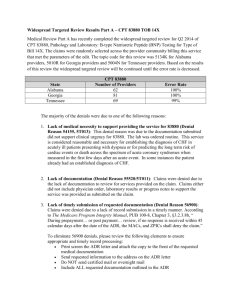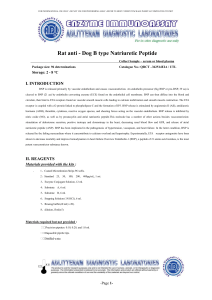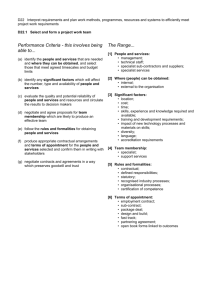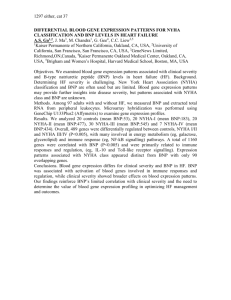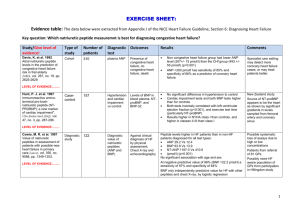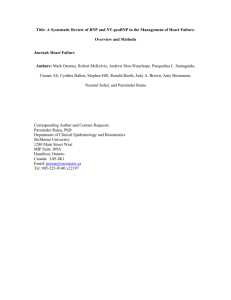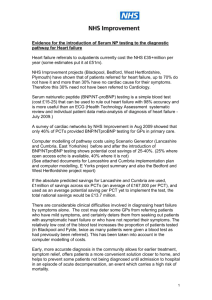BNP & NTPro-BNP - Al
advertisement
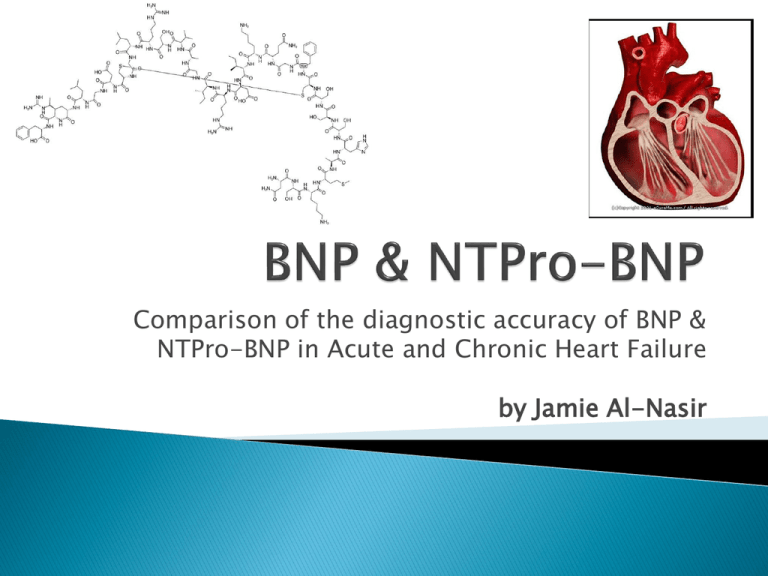
Comparison of the diagnostic accuracy of BNP & NTPro-BNP in Acute and Chronic Heart Failure by Jamie Al-Nasir What is BNP? ◦ A 32 amino acid polypeptide ◦ Belong to a class of structurally similar natriuretic peptides (classes A,B,C and D) ◦ Secreted by cardiac myocytes (mainly left) in response to excessive distension of the Heart ventricles ◦ Similar to ANP (Atrial Natriuretic Peptide) but has longer t1/2 (~20mins, double that of ANP) Named after extracts found in Pig-brain What is NT-proBNP? ◦ NT-proBNP is a biologically inactive 76 amino acid N-terminal fragment ◦ Co-secreted with BNP ◦ Even longer t1/2 than BNP (~1-2hrs vs ~20mins) Biological effects of Cardiac Natriuretic peptides ◦ Increase Natriuresis ◦ Decrease peripheral vascular resistance ◦ Overall reduce blood volume and therefore Cardiac Output Synthesis BNP and NT-ProBNP ◦ Assist in the diagnosis of Heart Failure (along with other tests and symptoms) ◦ Can be used to ‘grade’ the Heart Failure based on concentrations found by assay ◦ Useful in Prognosis Poor prognosis typically consistent with higher blood concentrations When is the test ordered? ◦ GP surgery or emergency setting I.e. Casualty/ER BNP/NTPro-BNP Assays ◦ ◦ ◦ ◦ Require a fully automated immuno-assay methods Immuno-assays are antibodies specific to different epitopes on the peptide chain Selection of epitope design based on enzymatic cleavage considerations BNP vs NTPro-BNP measurement have different advantages, I.e. due to t1/2 Objective ◦ “To compare the diagnostic accuracy of brain natriuretic peptide (BNP) and the N-terminal part of BNP (NTPro-BNP) assays for the diagnosis of Heart Failure.” Methods ◦ A Meta-analysis by Clerico, Fontana, Zyew et al, published in Clinical Chemistry ◦ Review contained only data generated by Parallel analaysis of Assays on same specimens ◦ Used Area under the Curve (AUC), Diagnostic Odds Ratio, Reciever Operating Characteristic (ROC) methods of deriving statistical conclusions from Gold standard and test under question in terms of specificity (true/false positives) and sensitivity. ◦ %Specificity and % Sensitivity for each study in the analysis was converted to an overall score This was performed for each study and categorised for Acute or Chronic HF Conclusions for diagnostic accuracy drawn on group (Acute or Chronic) and marker (BNP vs NTPro-BNP) Moses type ROC curves (Sensitivity vs 1-Specificity) Chronic HF Acute HF Solid lines/circles = NTPro-BNP Dotted lines/circles = BNP Statistical results ◦ (Table 1.0) - A statistical comparison of diagnostic accuracy of markers BNP and NTPro-BNP in acute and chronic Heart Failure Condition Acute HF Diagnostic Marker BNP NTPro-BNP DOR Score = 16.46 95% CI (10.65-25.43) DOR Score = 18.61 95% CI (10.65-25.43) Not significantly different Chronic HF DOR Score = 8.44 95% CI (4.66–15.30) DOR Score = 23.36 95% CI (9.38-58.19) Not significantly different Statistical conclusions ◦ ! There was some “dyshomogeneity” in the Chronic HF group results compared to Acute but this was not statistically significant – likely a result of greater homogeneity in acute Emergency setting ◦ Both BNP and NT-ProBNP have a “high diagnostic accuracy” ◦ Both are clinically relevant ◦ Both are suitable for Acute and Chronic Heart failure diagnostics Theoretical conclusions ◦ As BNP has shorter t1/2 therefore in theory can reflect more recent ventricular status References used ◦ 1. Comparison of the Diagnostic Accuracy of Brain Natriuretic Peptide (BNP) and the N-Terminal Part of the Propeptide of BNP Immunoassays in Chronic and Acute Heart Failure: A Systematic Review ◦ 2. NT-pro-BNP – A New Test for Diagnosis, Prognosis and Management of Congestive Heart Failure ◦ 3. Lab Tests Online ◦ http://www.labtestsonline.org.uk/
